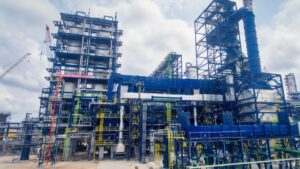
Funding, infrastructure woes threaten Nigeria’s gas supply to global market
According to the Nigerian Midstream and Downstream Petroleum Regulatory Authority (NMDPRA), Nigeria’s gas reserves grew to 209.5 trillion cubic (tcf) in 2022 which ranks as the ninth largest in the world, but harnesses only about 8 billion standard cubic feet per day (bscf).
Therefore, Nigeria’s goal of becoming a global supplier of gas is becoming bleak on the back of the huge infrastructure deficit in the industry, lack of adequate and necessary funding as well as its slow transition and optimisation of gas.
Industry stakeholders during the Decade of Gas Action Plan Dialogue held in Abuja this week noted that these constraints will also drag the implementation of the Decade of Gas initiative.
Lead of the domestic energy transition, Natural Resource Governance Institute (NGRI), Aaron Sayne has said that Nigeria requires over $1 trillion to build a new energy system and move from the use of fossil fuel, of which the source of such funds is currently unknown.
He added that foreign investments could have significantly covered the gap but the Nigerian domestic gas market as it is now is not a foreign investor’s dream in terms of policies and enabling environment.
“The IOCs have developed Nigeria’s gas when it suited their interests and wishes; as the IOC is moving away, the local indigenous of Nigerian oil and gas companies are looking to take their place, but how many of those companies have the capacity and the access to finance needed to pay for gas projects; banks have less capital to spend and a lot of them have bad experiences lending for domestic gas projects previously,” he said.
“This is worsened with the fact that companies are investing less in new gas projects because on the average, they do not make the predictable long term returns that oil exports do and hence see it as a less lucrative business.”
He expressed concerns about Nigeria being left behind, stating that following the Russia-Ukraine crisis, many EU countries are looking to Africa countries for supply and signing long terms agreements, however Nigeria stands the risk of losing its current market because countries like Spain, Portugal are speeding up their transition away from gas while other markets like Australia are being supplied at lower prices.
The Executive Secretary, Nigeria Extractive Industries Transparency Initiative (NEITI), Orji Ogbonnaya Orji said there is need to review the country’s gas utilisation policy to align with its energy transition plan.
“To a large extent, achieving the desired gas expansion will require an estimated $20 billion annually to bridge Nigeria’s infrastructure gap, given the shrinking fossil fuel investment landscape, clarity is required of the infrastructure to be prioritized,” he said.
“The Federal Government should develop and publish a detailed, realistic, costed, and comprehensive Gas Policy with clear roles for the state, non-state actors, and investors with timelines to track periodic progress; develop an industry-specific linkage between the integrated gas policy with Nigeria’s energy transition policies with a supporting action plan built on a robust monitoring and evaluation framework to track implementation,” he said.



